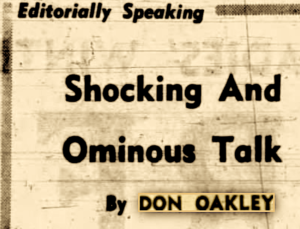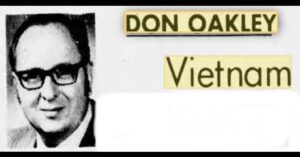It was the headline that caught me: “Shocking and Ominous Talk,” it blared.
 Really? Such language was rare in the Selma Times Journal (STJ), but I found it there, on the editorial page of the New Year’s Day edition, for January 1, 1965.
Really? Such language was rare in the Selma Times Journal (STJ), but I found it there, on the editorial page of the New Year’s Day edition, for January 1, 1965.
The Alabama headline shone up at me from a cloudy gray background, on a microfilm reader in a library basement at Harvard. The paper’s full year’s run for 1965 took up only one medium-thick roll, but was likely over 3000 pages.
It was late 1972 when I fed the microfilm spool into the reader, resolved to read every one of those pages. They were key background for what became my book, Selma 1965: The March That Changed The South. The voting rights campaign the book charted was led by Dr. Martin Luther King, Jr. and SNCC, and was set to begin the next day, January 2. That was also the day I first crossed the Edmund Pettus Bridge and set foot in Selma, as a rookie on Dr. King’s staff.
![]() Tension about the imminent civil rights incursion had in fact been high in Selma that holiday; I already knew that. But in the sixteen pages of the STJ’s New Year issue, there was not a word about it. Instead, the “shocking and ominous talk” headline spoke of something just as important, but which I had hardly if at all thought about at the time:
Tension about the imminent civil rights incursion had in fact been high in Selma that holiday; I already knew that. But in the sixteen pages of the STJ’s New Year issue, there was not a word about it. Instead, the “shocking and ominous talk” headline spoke of something just as important, but which I had hardly if at all thought about at the time:
Vietnam. Two sentences made its point:
The war is being lost in South Vietnam, and no amount of power juggling in Saigon and no amount of American military aid and advice has been able to change that fact.
Indeed the question that may now have to be faced is whether the war can be won at all–with or without its escalation into a larger conflict and full scale United States involvement.
I was stunned to read this. At the beginning of 1965, for the American public, Vietnam was not yet a “real” war. It would soon become that. By the end of the year covered by the STJ’s small reel, it would come to shape and deform the futures of millions of Americans, from legions of military draftees, to the the newly-elected president Lyndon Johnson. Their lives, and mine.
But that process of commandeering the public agenda and the destiny of so many was still months ahead in January. The America establishment, of both parties, was then solidly behind whatever the White House and the Pentagon decided to do to stop the Communist forces in Indochina. What soon became a mass domestic protest movement was still only a shadowed gleam in the eyes of scattered leftists and pacifists, all still dodging the darts of professional red-baiters.

Yet here in this obscure newspaper in the very rural Black Belt, was a declaration, really a kind of prophecy, not only that it would all be for naught, but in fact already was. When I finally noticed it, seven years after in that library basement, most U.S. troops had been withdrawn from Vietnam, after 58,000 dead, hundreds of thousands wounded, and millions of veterans and their families headed into decades shadowed by PTSD and other plagues, an era which has not yet entirely ended.
But even then in late 1972, the tide had turned but the Vietnam horror was hardly over: there was still to come the shameful spectacle of the helicopters at the emptied U.S. embassy in Saigon (about to become Ho Chi Minh City), the hundreds of thousands of pro-US Vietnamese and their families left behind.
 Don Oakley, the pundit here, worked for a national news service. Over twenty-plus years he churned out hundreds of innocuous “features” which the company sent out to hundreds of smaller provincial papers along with comic strips about Bugs Bunny and The Born Loser. Oakley’s output normally went down without a ripple. Yet here was pronouncing the coming war a failure in advance.
Don Oakley, the pundit here, worked for a national news service. Over twenty-plus years he churned out hundreds of innocuous “features” which the company sent out to hundreds of smaller provincial papers along with comic strips about Bugs Bunny and The Born Loser. Oakley’s output normally went down without a ripple. Yet here was pronouncing the coming war a failure in advance.
Preparing this blog post, I skimmed dozens of Oakley’s features in the search for the original of this piece; all went down like potato chips, quick bites, indistinguishable.
But this one has stuck with me: the quote opens the first chapter of my book, as the harbinger of what was to come which I did not notice at the time, but was as plain as the day’s newspaper.
A harbinger about Vietnam, and then repeated, more than once. Re-reading it again now, it seems like a bass melody of our national life, including mine, since then: change the name from Vietnam to Iraq and now Afghanistan (with more to come, I expect), and Oakley’s 56-year old verdict is just about as true and telling.
If I wanted to point fingers, it could be done in almost any direction including my mirror. Sure I have protested many of the wars, but I have also paid my taxes, which were perhaps only the most easily documented form of my personal complicity.
And now it is happening again.
Do Oakley referred rather gingerly to “the question that may now have to be faced,” which was “whether the war can be won at all . . . .”
He was right, But as a group, Americans and our government did an excellent job of refusing to face that question, for a decade in Vietnam, and now for twice that long in Afghanistan, until it was forced on us at the points of the adversary’s weapons.
I was young then, and now I am old. Yet if I remain much longer, I expect to see such tableaus re-enacted elsewhere, perhaps even inside our borders.
After all, a wildfire that is larger than New York City will have much the same effect as a human conquerer.
And if that final helicopter were to hover above the park down the hill from me, and I were not too feeble to climb the swinging rope ladder with a few others, where exactly do we think it might take us?
And who would be ready to take us in?

As an antiwar activist in the 1960s, we were very much impressed by Gen. Douglas Macarthur’s warning that the United States should never fight a land war in Asia.
The US has fought three such major wars since Macarthur’s war in Korea ground to an armistice. None of them turned out particularly well.
That, and Quaker Maj. Gen. Smedley Butler’s warnings about the subservience of US military to US and multinational big business, were main features of our antiwar argumentation in the 1960s and 1970s.
Nothing much has changed. Or, as Pete Seeger sang: When will they (we) ever learn?
Every large organization suffers from multiple layers of “sucking up” to the layer above. By 1965 Bernard Fall and E.F. Stone knew the war was unwinnable (that’s when I read them) due to a combination of culture and geography, just as proved to be the case in Afghanistan. That Oakley got it is big news — but then again, he was in a big organization, so it never got traction.
So far, the exit from Afghanistan is a cakewalk compared to our exit from Vietnam. It was TV War. The bloody images came to us everyday. A whole generation of Americans fought, protested, or both The exit was harrowing, bloody, and plane full of children crashed, No civilians made it. They were left to be killed,, become boat people, refugees.
Afghanistan is a forgotten war. And now everyone is an expert on how to withdraw. the President is not in the wrong, WAR IS WRONG.
How could the President have gotten it so wrong on how to execute the withdrawal? Yet, could ANYONE have gotten it “right?” Gi=ven that war is the wrong approach from beginning to end…
As my husband says, “No one in the school yard ever changed their opinion at the end of the school bully’s fist.” And it appears that nations don’t change their history and culture and society at the end of a rocket – if anything, the rockets make them dig in even more to their previous ways – as fear always tends to make us do…
May we find the freedom from FEAR (through LOVE) that allows us to grow and change in new, more prosocial ways.
NOW LET US TRY WHAT LOVE CAN DO